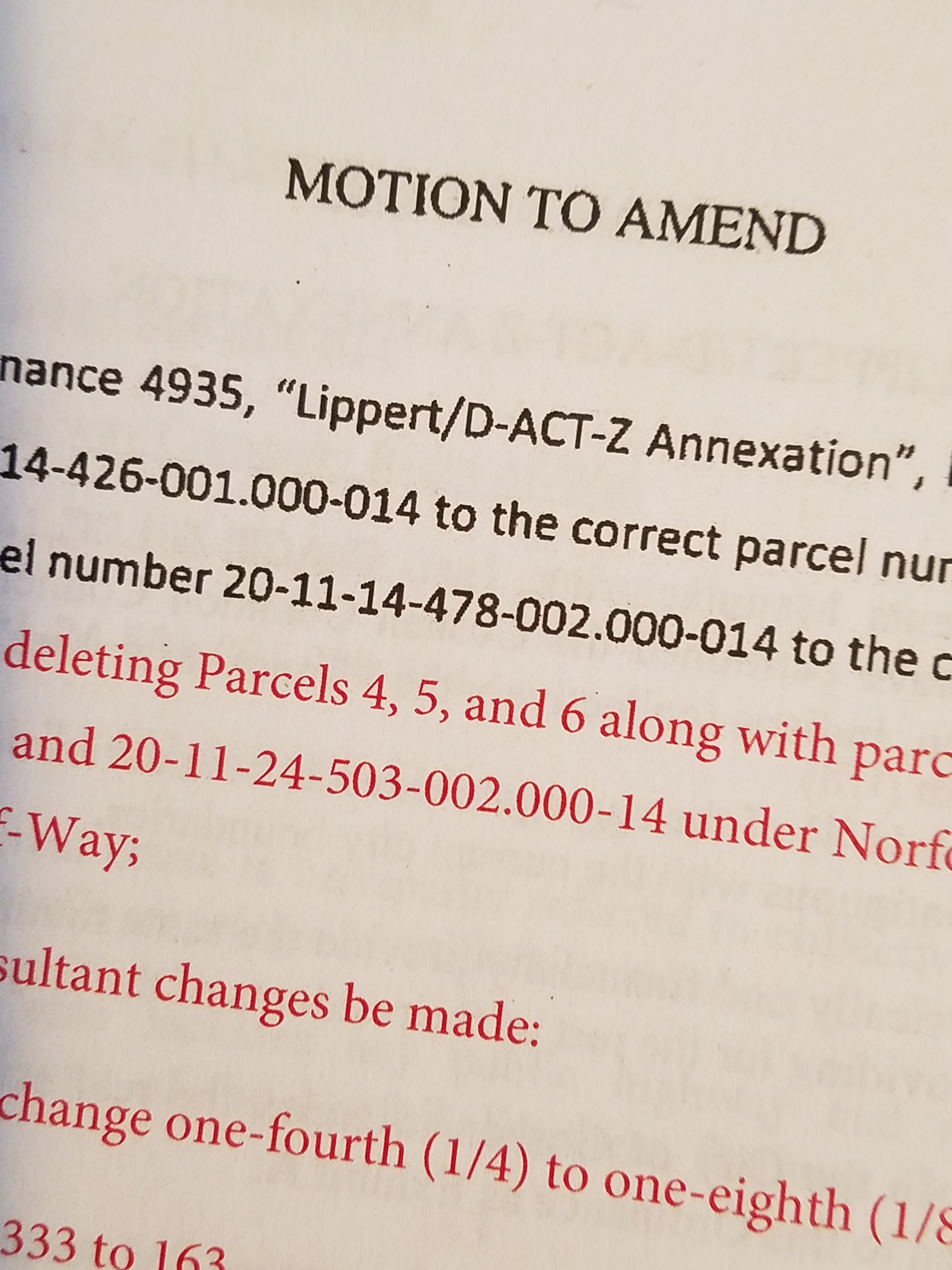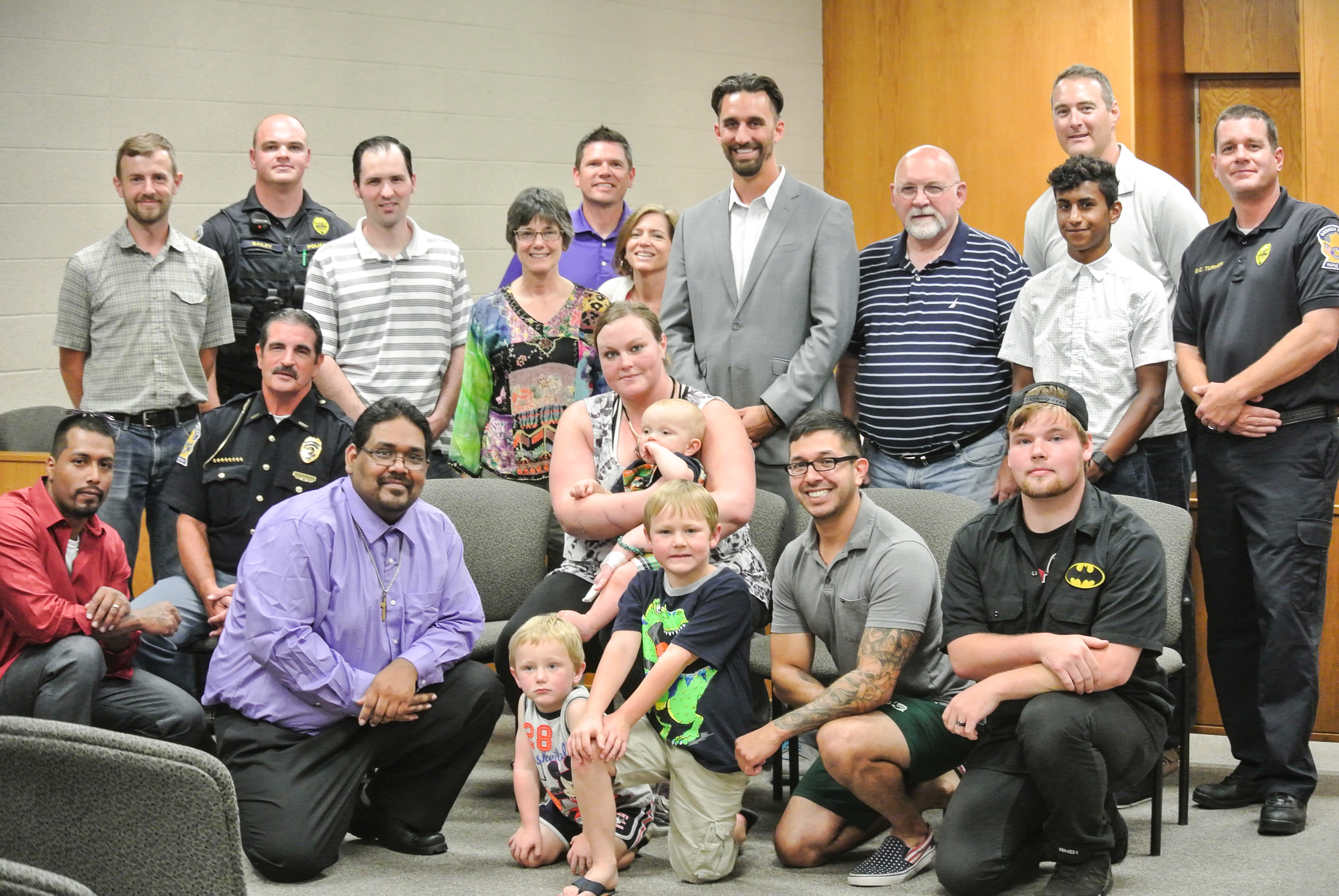 The nature of compromise is that everybody gives an inch or a foot or a hand. The point is that no one gets everything they want, but everyone gets a bit of what they need. It’s the opposite of anchovy pizza.
The nature of compromise is that everybody gives an inch or a foot or a hand. The point is that no one gets everything they want, but everyone gets a bit of what they need. It’s the opposite of anchovy pizza.
We revisited a controversial annexation proposal at Tuesday’s (Feb. 6) Council meeting and I think it’s safe to say we were all hungry for compromise. The chamber was full. There was an extensive cast of characters — from homeowners worried about the proposed annexation, to Lippert workers and managers eager to expand the company’s reach and footprint. The room was so packed with people bundled up in their winter wear that some folks started to turn a little pink and fan themselves with the printed agendas. Eventually the city engineer had mercy on us all and turned the thermostat down a couple of degrees.
Before Tuesday’s meeting I had participated in multiple conversations. I’d met with homeowners near the proposed annexation area and with Lippert managers; I’d talked with residents from Springbrook and Gorham Woods. The hard part was that everyone sounded reasonable. Everyone had a valid point of view (OF COURSE Lippert wants to innovate and grow; OF COURSE homeowners don’t want to be surrounded by industry. OF COURSE people worry about traffic and trash and factory noise.).
So we’re all packed together in a hot room on a cold February night. It’s tense because that’s how these things are. No one wants to lose. It never feels good.
Then there’s a surprise (it wasn’t actually a surprise to me, because we’d talked about it before the meeting; but it was a surprise in the room). It turns out that Councilman Scharf did some checking and re-checking and discovered a miscalculation regarding the contiguity requirements (in other words, the annexation area could be reduced and still legally qualify). As a result, Scharf proposed removing the D-ACT-Z parcels from the annexation, which meant that the nearby homeowners would NOT be entirely surrounded by industry (their biggest concern).
People looked around at each other wearing hopeful, wide-eyed expressions. The D-ACT-Z guy, tanned and relaxed, walked from the back of the room up to the lectern and said something along the lines of…”that’s fine with me.” He was happy to cooperate, to disconnect his parcels of land from the proposed annexation if it would help Lippert with its annexation request. So we all hopped on board the solution. Together. Not that everyone was thrilled. But for the most part, people seemed to get that it was a good faith effort at improving the situation.
We are crossing our fingers that Councilman Scharf’s calculations were accurate (they will be measured yet again before the next meeting).
I wasn’t sure how the evening would unfold. I didn’t know how my colleagues would respond to Scharf’s amendment, or how the homeowner’s or D-ACT-Z would respond. If the amendment failed, I was prepared to vote against the annexation entirely. And however I voted, I was prepared to be on the receiving end of anger or disappointment, because these are big-deal issues. So the cooperative spirit people demonstrated was a welcome relief.
At our Jan. 16 meeting, my heart hurt for the homeowners adjacent to the proposed annexation (for real, it ached). What was happening to them seemed completely wrong. The vote to table the item to learn more about the situation felt like the only ethical way through. It gave council members the chance to get in front of all the various stakeholders, to ask questions, to make suggestions, to read the situation more fully.
In addition to time spent talking with concerned residents, I was able to look Lippert managers in the eye (and believe them) when they said they’re prepared to be good neighbors. They talked about visual and sound buffers. They talked about creating a position to deal with all the issues that can crop up around a bustling factory building. They helped me understand that there wouldn’t be as many new workers on the road as I had thought (instead, there would be mostly shifting of workers from the current site just down the road to the new site). They said they are interested in meeting with residents to listen and to adjust their plans.
Ultimately, it felt like our imperfect democratic system kind of…. worked. It felt like the whole idea of elected officials — of people who aren’t personally connected to a situation, but invested in fairness and the larger community good — paid off (figuratively; to be clear, nobody paid me).
There were checks and balances: people moving fast were asked to slow down; people who wanted no movement were willing to shuffle.
This is just the beginning of what will be a significant change in that part of town and we’ll need to stay engaged, to follow-up on the promises and the outcomes. I don’t want to claim collective victory before the game’s over.
But I do want to mark this moment, this feeling of gratitude and of pride in a whole bunch of people who showed up to a hot room on a cold night.

 DISCLAIMER: This adorable puppy (my dog about 10 years ago) has nothing to do with this post. I tried six times to upload a relevant photo of last night’s agenda, got six annoying error messages… and then gave up. This photo represents flexibility. And moving the heck on.
DISCLAIMER: This adorable puppy (my dog about 10 years ago) has nothing to do with this post. I tried six times to upload a relevant photo of last night’s agenda, got six annoying error messages… and then gave up. This photo represents flexibility. And moving the heck on.